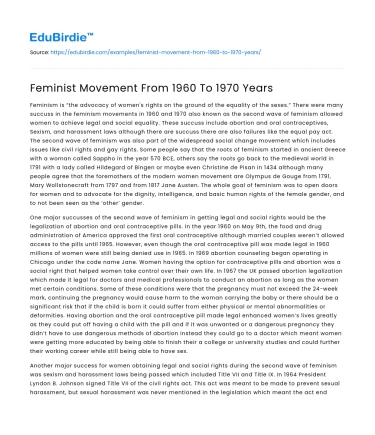Feminism is “the advocacy of women's rights on the ground of the equality of the sexes.” There were many succuss in the feminism movements in 1960 and 1970 also known as the second wave of feminism allowed women to achieve legal and social equality. These succuss include abortion and oral contraceptives, Sexism, and harassment laws although there are succuss there are also failures like the equal pay act. The second wave of feminism was also part of the widespread social change movement which includes issues like civil rights and gay rights. Some people say that the roots of feminism started in ancient Greece with a woman called Sappho in the year 570 BCE, others say the roots go back to the medieval world in 1791 with a lady called Hildegard of Bingen or maybe even Christine de Pisan in 1434 although many people agree that the foremothers of the modern women movement are Olympus de Gouge from 1791, Mary Wollstonecraft from 1797 and from 1817 Jane Austen. The whole goal of feminism was to open doors for women and to advocate for the dignity, intelligence, and basic human rights of the female gender, and to not been seen as the ‘other’ gender.
One major succusses of the second wave of feminism in getting legal and social rights would be the legalization of abortion and oral contraceptive pills. In the year 1960 on May 9th, the food and drug administration of America approved the first oral contraceptive although married couples weren’t allowed access to the pills until 1965. However, even though the oral contraceptive pill was made legal in 1960 millions of women were still being denied use in 1965. In 1969 abortion counseling began operating in Chicago under the code name Jane. Women having the option for contraceptive pills and abortion was a social right that helped women take control over their own life. In 1967 the UK passed abortion legalization which made it legal for doctors and medical professionals to conduct an abortion as long as the women met certain conditions. Some of these conditions were that the pregnancy must not exceed the 24-week mark, continuing the pregnancy would cause harm to the woman carrying the baby or there should be a significant risk that if the child is born it could suffer from either physical or mental abnormalities or deformities. Having abortion and the oral contraceptive pill made legal enhanced women’s lives greatly as they could put off having a child with the pill and if it was unwanted or a dangerous pregnancy they didn’t have to use dangerous methods of abortion instead they could go to a doctor which meant women were getting more educated by being able to finish their a college or university studies and could further their working career while still being able to have sex.
Another major success for women obtaining legal and social rights during the second wave of feminism was sexism and harassment laws being passed which included Title VII and Title IX. In 1964 President Lyndon B. Johnson signed Title VII of the civil rights act. This act was meant to be made to prevent sexual harassment, but sexual harassment was never mentioned in the legislation which meant the act ended up just protecting women and men in the workplace as this law made it illegal to discriminate based on sex, religion, and any other contributing factor. Some ways Title VII changed the workplace was employers could not discriminate when hiring, firing, promotions, recruitment, use of company facilities, retirement plans, and more. Another law that was passed by congress in 1972, Title IX forbids sex discrimination in federally funded and colleges which then allowed women into school athletics as well as other activities. The purpose of Title IX was to create a safe learning and sporting environment for women to further their education.
However not everything these women worked towards was always successful, this can be seen by the equal pay act of 1963. By the early 20th century women made up a quarter of the American workforce but were still only being paid 59 cents to the man’s dollar. On June 10th, 1963 President John F Kennedy signed the equal pay act. Even with the equal pay act being signed 50 years on there is still a wage gap and women in today’s age are getting paid 79 cents to the man’s dollar and overall the gap costs American women $500 billion dollars a year. The act didn’t work as there are many loopholes such as this one 'a differential based on any other factor other than sex” this causes many problems for women trying to fight their case this also made women feel as though it was useless to try to file a lawsuit and with the media eager to undercut the success of the women in the second wave of feminism they would latch onto any negativity painting feminists as angry, man-hating, cold and unfeeling people it made it harder for women to fight their case. Another equal pay act was passed in January 2009 known as the pay check fairness act.
With everything considered the second wave of feminism was largely successful when trying to achieve legal and social rights, examples of that would be legalizing abortion and oral contraceptives as well as having laws created against sexism discrimination, and harassment. Although by saying that feminism between the 1960s and 1970s there were also downfalls like not fully achieving equal pay. The ambitious goal of achieving equality in legal and social rights may still be a long journey.






 Stuck on your essay?
Stuck on your essay?

